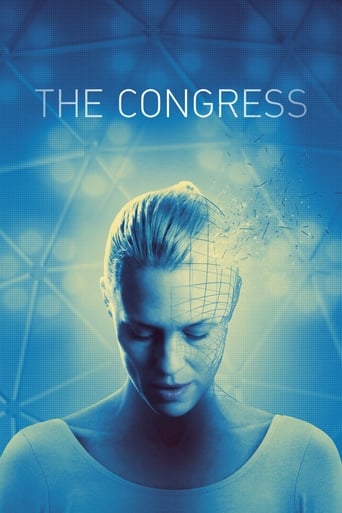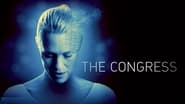room102
A movie by Ari Folman, who made the fantastic "Waltz with Bashir (2008)".Robin Wright plays herself in this weird drama/sci-fi movie that is half live action and half animation.The first half of the movie is awful. Poorly directed, badly acted by the entire cast, poorly written and terribly slow.This movie is a mess and almost unwatchable. And it's too bad because during the second half of the movie there is some great animation and score, especially in the last quarter.Skip this movie. Watch (or re-watch) "Waltz with Bashir (2008)" instead.
SnoopyStyle
Robin Wright is a struggling diva actress with opportunities slowly drying up. Her son Aaron (Kodi Smit-McPhee) is slowly losing his sight and hearing as he's treated by Dr. Barker (Paul Giamatti). Al (Harvey Keitel) is her agent. Sarah (Sami Gayle) is her daughter. She sells her digital image to the studio for a big payout and she isn't allowed to perform anywhere else. Twenty years later, her image is popular and she is invited to speak at the Miramount Congress. The world is animated where people take on an avatar.The subject matter is very Hollywood and not an interesting one for me. It's more compelling for actors and philosophers. It's a bit silly to have an hand-drawn animated avatar. They made that little scene of lifelike avatars example. It should have followed that track. I like that type of outsider animation but it makes no sense for this movie. Also the movie is very slow. The plot is a mess. The acting in the live action is pretty good from top notch people. The movie should have gone a different way.
Chris Sennfelder
I watched this movie with a friend a few days ago and I'm still thinking about it. It's a very daring piece of art, playing with both the viewer's expectations and the boundaries of human consciousness. If you're into straight-up sci-fi with loads of action and suspense, this movie is nothing for you. But if you want to be taken on a mind-blowing trip into the depths of philosophical questions about free will, orwellesque futurism and life after death, it's one hell of a ride.Giving a plot synopsis would spoil the experience. Just let yourself go and don't try to overanalyze the movie when you watch it for the first time. In my opinion, every iteration of Robin Wrights journey represents a state of mind. Every Robin Wright you see is her and not her, as it is made brutally clear that everyone is acting the whole time. With every step, Wrights self is being mirrored. And every mirror image shows a deeper layer of human consciousness.Of course, the whole thing is kind of "meta". This is what makes "The congress" an important statement in our era.
Cd1083
Expectations for a film are very powerful. When we walk into a theater/put a disc into the player, we have an create an idea of what is in store. When the product delivered is different from our anticipations, our judgements can become skewed. Upon viewing the trailer for The Congress I believed I understood what the film was going to be about; after finishing the film, I have no idea what I just watched. The plot I understand, it's everything else that I'm still hazy on. The general idea of the film is that Robin Wright, playing herself, is given a final role. The role is to become a product. No longer allowed to act, Wright will only be seen on screen via her computer generated avatar. Her initial hesitation to this offer are obvious. Robin doesn't like the idea of a conglomerate film company controlling her image. This idealistic desire is immediately shot down by her agent as the film makes it important to note that Robin Wright's career has been a colossal failure. Every decision she has made is a bad one and her decision to decline this opportunity of a lifetime is just another example of it.Once Robin agrees to sell off her image for peanuts, she wants the process to take no longer than it has to and requests the scanning process be completed right away. Despite her forceful request, she still acts reluctant to have the procedure. This indecisiveness is prevalent throughout the film as we're never quite sure what her priorities are. What does Robin want? She says that she wants to save her son. Even the trailer puts the plot point as a primary objective, but that case isn't made very clear during most of the story. There are moments here and there where she reminds us all, but the film puts the sizzle before the steak and that ends up being its defining flaw. There ends up being an important moral message at the core of the film. It's not until the end that we even get an inkling of what it's trying to say, but it's there nonetheless. The Congress does a good job early on building likable characters within Robin's family. We learn that her son, Aaron, has a disease that is slowly deteriorating his vision and hearing. We are also introduced to Robin's 'daughter', who inexplicably disappears a third of the way into the movie. The only character established early on who remains one of relevance is "Miramount" studio executive and antagonist, Jeff Green. Instead of further fleshing out these characters, we are given an out of this world experience that becomes far too bizarre for most to grasp on a single viewing.The film is directed by Ari Folman and was loosely adapted from a 1971 Science-Fiction novel, "The Futurological Congress." Folman is someone I wasn't familiar with prior to now. His prior films were non- English documentaries and even this film is not considered an American film as it was first released over in Europe. Folman's approach for the Congress is what many could consider avante-garde, despite the fact that it's really not presenting anything new. The hybrid live-action/animation film has been done many times before (Roger Rabbit, Cool World, Looney Tunes) and the alternate state of mind film has been done before. (The Matrix, Inception, Trance) The Congress attempts to do them together and it mostly succeeds. Mostly. Visually, the film is remarkable. From the very beginning, before the animation kicks in, the colors and lighting are amazing. The colors pop from the screen and cinematically the film draws you in for something you know is going to be special. Once we transition over into the 'alternate' state of being, the sophisticated beauty is replaced with a uncanny callback to classic cartoons of day's past. The idea being that the experience is unique to each person who implies Robin's experience is a reflection of her childhood surrounded by traditionally animation while a younger individual may create a world of CGI. I'm interested in watching more behind the scenes of the film, if only to learn more about how it was created. How have the technologies advanced from earlier films with similar visual styles.When a film features a cast of Robin Wright, Paul Giamatti, Harvey Keitel, and Jon Hamm I would expect the acting to be in the bag. While the plot does a good job of creating characters I want to get to know, the dialog is dull and apathetic. It's almost as if everybody lost a bet and was forced to do this film pro-bono. The moment Robin steps inside the world of animation for the first time, her attitude approaches apathy. She acknowledges the novelty of it as if she were looking at a caricature of herself at the state fair instead of living it out. This lack of interest in the world she inhabits is infective as I felt the same wayThe Congress is one of those films I absolutely will have to watch again in order to have a true opinion of the quality. The disjointed nature made it difficult to follow and boring at times. I found myself not caring about what happened. It felt more like a tour inside the world it created instead of a story being told. The end felt rushed if only because I didn't know where we were going. So when we arrived I was surprised at where we ended up. Despite my overwhelming criticisms of the film, I love the premise and visuals enough that I'd be able to view it again in order to gain a better understanding of the message being told.Read this and my other reviews at CD1083.com





